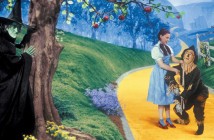
Editor’s Notes: Gabriel is currently out in limited theatrical release.
Gabriel (Rory Culkin) takes a detour on his way home for winter break, stopping at another university, hoping to find his former girlfriend Alice (Emily Meade). Intense and a little off-putting, he still manages to get help from a wary student, and then talk his way into Alice’s apartment house, claiming that he is her cousin. When he finally gets on a bus to go home, his older brother Matthew (David Call) is at the station to meet him, livid at Gabriel’s lateness and telling him in no uncertain terms that, had he not been on that bus, the police would have been called.
The film is always one step ahead of us, throwing little curve balls and unexpected moments at us, keeping us guessing.
Gabriel, the first feature-length film from writer-director Lou Howe, slowly reveals the story behind Gabriel’s obsession with Alice, as well as his family’s distrust, which turns out to have been well-earned. Emotionally disturbed and with a tendency to not take his medication, Gabriel operates in a reality just south of our own, unable to connect with anyone in a normal way. But he’s crafty and always one step ahead of his family (and, presumably, the authorities), and in turn, the film is always one step ahead of us, throwing little curve balls and unexpected moments at us, keeping us guessing long after any other film would have drowned in a sea of stereotypes.

In a film full of solid performances, including the delightful Deirdre O’Connell as Gabriel’s mother Meredith, Rory Culkin stands out. He gives a tremendous turn as the confused and disturbed twenty-something, and has a remarkable ability to pinpoint little details in behavior that are so understated that, if they’re noticed at all, it’s on an almost unconscious level. It’s a delicate performance, subtle enough that you can understand why so many people around Gabriel don’t realize he’s troubled. Gabriel’s lies are convincing mostly because Gabriel himself believes them, even as he knows what he’s saying is untrue. It’s impossible for us to truly understand, and in fact, early in the film, we understand so little that we’re not even sure if Gabriel is troubled or just misunderstood.
The film wants us to be lulled into complacency as we think we’re watching just another young white dude who has an obsession with a former love.
That early ambivalence has the unfortunate effect of making Gabriel a dull character. The film wants us to be lulled into complacency as we think we’re watching just another young white dude who has an obsession with a former love; as Mark Young at Sound on Sight noted, Gabriel’s behavior isn’t all that unusual within the context of a romantic comedy. But relying on the audience’s tolerance for inappropriate behavior, as long as it occurs within the context of obsessive romance, makes the first third of Gabriel quite a trudge as we wait for the film to reveal the true extent of his emotional issues.
Once the seriousness of his condition is fully established, Gabriel really comes into its own. His schemes and off-kilter plans are just unpredictable enough to keep our interest, and the hints that his own impending adulthood have caused his condition to worsen add depth. Ably framed by cinematographer Wyatt Garfield, much of the film has the same overcast, low-contrast feel as big-budget thrillers of the 1990s, though a few scenes on the streets of the city, and one lovely shot of Gabriel running through a field, are outstanding. Ultimately, it’s the quiet study of a soul on the brink that’s the true attraction here, and the knowledge that, despite the love surrounding Gabriel, there is nothing to be done.
It's the quiet study of a soul on the brink that's the true attraction here, and the knowledge that, despite the love surrounding Gabriel, there is nothing to be done.



